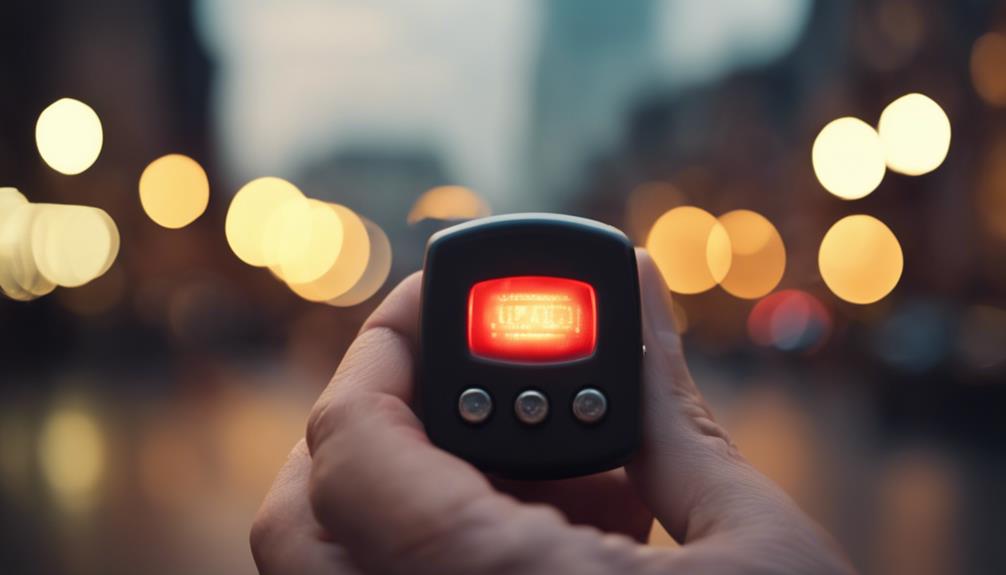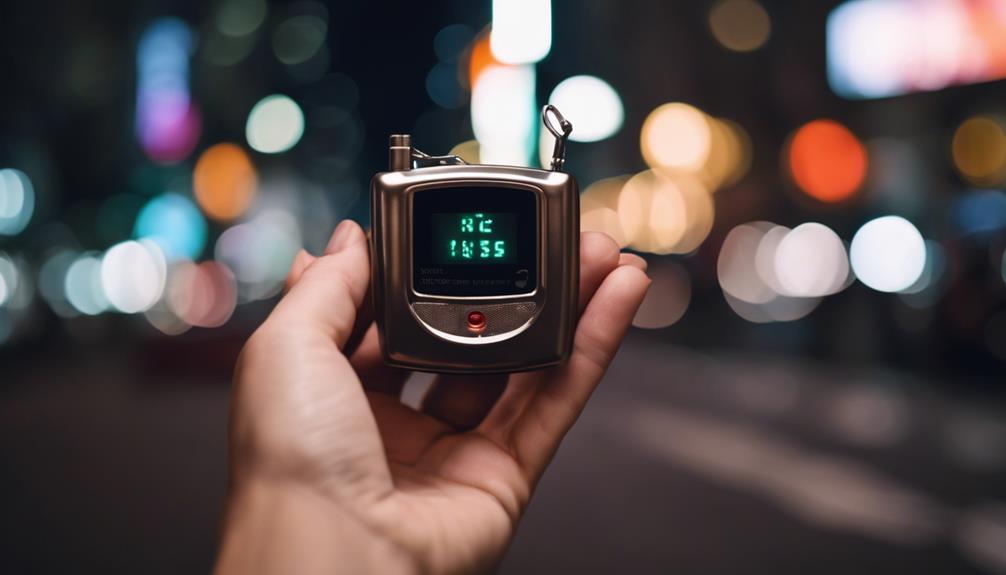
Brainstorm Security Shop

For Orders Over $199

On Any Of Our Products

Details On Refund Page
Imagine you’re walking home late at night, the streets are empty, and the faint echo of your footsteps is the only sound accompanying you. Suddenly, you sense someone following you. In that moment, wouldn’t you wish you had a simple way to protect yourself? A personal alarm could be your answer. These small devices are not only easy to carry but can also be a game-changer in dangerous situations by emitting a piercing sound. However, are they really effective in all scenarios? Let’s explore the true impact of personal alarms and consider whether they’re the best choice for ensuring your safety.

Personal alarms are compact devices designed to emit a loud sound to deter attackers and alert others in case of an emergency. You’ll find them small enough to fit in your palm or hang on a keychain, making them convenient to carry wherever you go.
Typically, these alarms are activated by pulling a pin or pressing a button, which then triggers a piercing noise that can reach up to 130 decibels.
Understanding the mechanics of a personal alarm is straightforward. They usually operate on batteries, which you’ll need to check and replace periodically to ensure they’re always ready when you need them. Some models are rechargeable, offering you ease of maintenance and continuous reliability without the ongoing cost of batteries.
It’s also important to know where you can legally carry these alarms. Most places in the United States allow them without restriction, but it’s wise to check local laws if you’re traveling. You don’t want to find yourself in a situation where your primary means of defense isn’t permitted.
Lastly, familiarize yourself with how to use your personal alarm effectively. Practice pulling the pin or pressing the alarm button so that if an emergency arises, you’re not fumbling with the device. Quick, confident action could make all the difference.
Understanding how personal alarms work, you’ll appreciate the multiple benefits they offer for your safety and peace of mind. When you carry a personal alarm, you’re not just carrying a device; you’re carrying a deterrent. The loud noise they emit when activated can startle and disorient an attacker, giving you crucial seconds to escape or draw attention. This feature alone enhances your confidence when navigating through less secure environments.
Moreover, personal alarms are incredibly portable. You can attach them to your bag, belt, or keychain, ensuring they’re always within reach during an emergency. Unlike other self-defense tools, personal alarms don’t require any special training to use. You’ll find them straightforward—just press a button or pull a pin, and the device does the rest.
They’re also legal to carry everywhere, which isn’t the case with many other defensive tools like pepper spray or tasers. This legality removes the worry about compliance with local laws when you’re traveling. With a personal alarm, you’re prepared to protect yourself in any situation, without the risk of legal ramifications or the need for physical confrontation.
Carrying a personal alarm lets you walk through life a little easier, knowing you’ve got a way to protect yourself that’s simple, effective, and legal.
When choosing a personal alarm, consider key features that enhance usability and effectiveness. You’ll want to look for a device with a loud alarm. Typically, alarms range from 100 to 130 decibels. This volume can significantly startle an attacker and attract attention from others nearby.
Consider the ease of activation. You need a device you can activate quickly and effortlessly in an emergency. Look for alarms that feature a simple pull-pin or push-button mechanism. You don’t want to struggle with complicated switches or multiple steps when every second counts.
Battery life is another crucial factor. Check how long the battery will last and opt for models with replaceable batteries to ensure your alarm is always ready when you need it. Some alarms even come with low battery indicators, which can be a handy reminder to keep your device charged or batteries fresh.
Lastly, think about portability and durability. A good personal alarm should be small enough to carry easily in your pocket, purse, or on a keychain, and it should be robust enough to withstand daily wear and tear. Make sure it’s a device that you can rely on day in and day out.
You’ll find several different types of personal alarms, each designed to suit various needs and preferences. Keychain alarms are popular because they’re easy to carry and can be attached to your bag, keys, or belt. When triggered, they emit a loud, attention-grabbing sound.
Pendant alarms, worn around your neck or on your wrist, offer quick access and are ideal if you’re looking for something that’s always on your person.
For a more high-tech option, consider smart alarms that connect to your smartphone via an app. These can send your location to emergency contacts or local authorities when activated. Some even include additional features like flashing lights or voice commands, enhancing your safety measures.
There are also specialized alarms for runners and outdoor enthusiasts. These are typically more rugged, designed to withstand elements, and often come with an adjustable wristband. Their loud siren can deter an attacker and alert passersby, even in remote areas.
Choosing the right type depends on your lifestyle and the level of convenience and security you’re after. Consider what situations you’ll mostly use the alarm in, whether you need something discreet or something that stands out in a crisis.

To use a personal alarm effectively, ensure it’s readily accessible at all times. Attach it to your keychain, handbag, or belt loop where you can grab it instantly. Remember, the effectiveness of a personal alarm is in its ability to surprise and disorient an attacker, buying you precious seconds to escape or draw attention.
Practice using it; don’t wait for an emergency to find out how it works. Familiarize yourself with the alarm’s button or pull pin. Test it regularly to ensure it’s working properly and that the battery doesn’t need replacing. You don’t want to discover it’s non-functional when you need it most.
Keep it discreet but within easy reach. If it’s visible, an attacker might try to disable it. However, you should be able to activate it quickly, even under stress. Train yourself to activate the alarm as a reflex action. Simulate scenarios in your mind where you might need to use it. This mental rehearsal can help reduce panic and increase your reaction speed during real situations.
Lastly, don’t rely solely on your personal alarm for safety. Stay aware of your surroundings and avoid risky areas when possible. Combining the alarm with other safety strategies enhances your overall defense.
While understanding how to use a personal alarm is important, it’s also vital to know the legal implications of carrying and using one. You’ll find that in most places, personal alarms are perfectly legal as they’re considered non-violent tools for self-defense. However, you should still check your local laws. Some areas might’ve specific regulations about the sound level or the type of alarm you can carry.
You also need to consider how and when you use your alarm. It’s designed to draw attention and help deter attackers, not to cause harm or unnecessary disturbance. Misusing a personal alarm in a non-threatening situation, just to prank or annoy, could lead to legal issues like fines or, in extreme cases, charges for creating a public disturbance.
Always use your personal alarm responsibly. Think of it as a fire alarm – you wouldn’t activate it without a real reason, right? The same goes for your personal safety device. It’s there to protect you, not to be used carelessly. Being aware of these legal aspects helps ensure that you not only protect yourself effectively but also responsibly.
Now that you’re familiar with personal alarms, consider the peace of mind they can offer. Whether you’re walking home late or exploring unfamiliar areas, a personal alarm is a simple, effective tool for your safety arsenal.
Remember to choose one that suits your needs and understand the legalities. Embrace this small but mighty device—it could make a big difference in your personal security.
Stay safe and empowered with your personal alarm by your side.

Brainstorm Security Shop
1867 Caravan Trail
Ste 105
Jacksonville, FL 32216
Call us toll free: (800) 859-5566